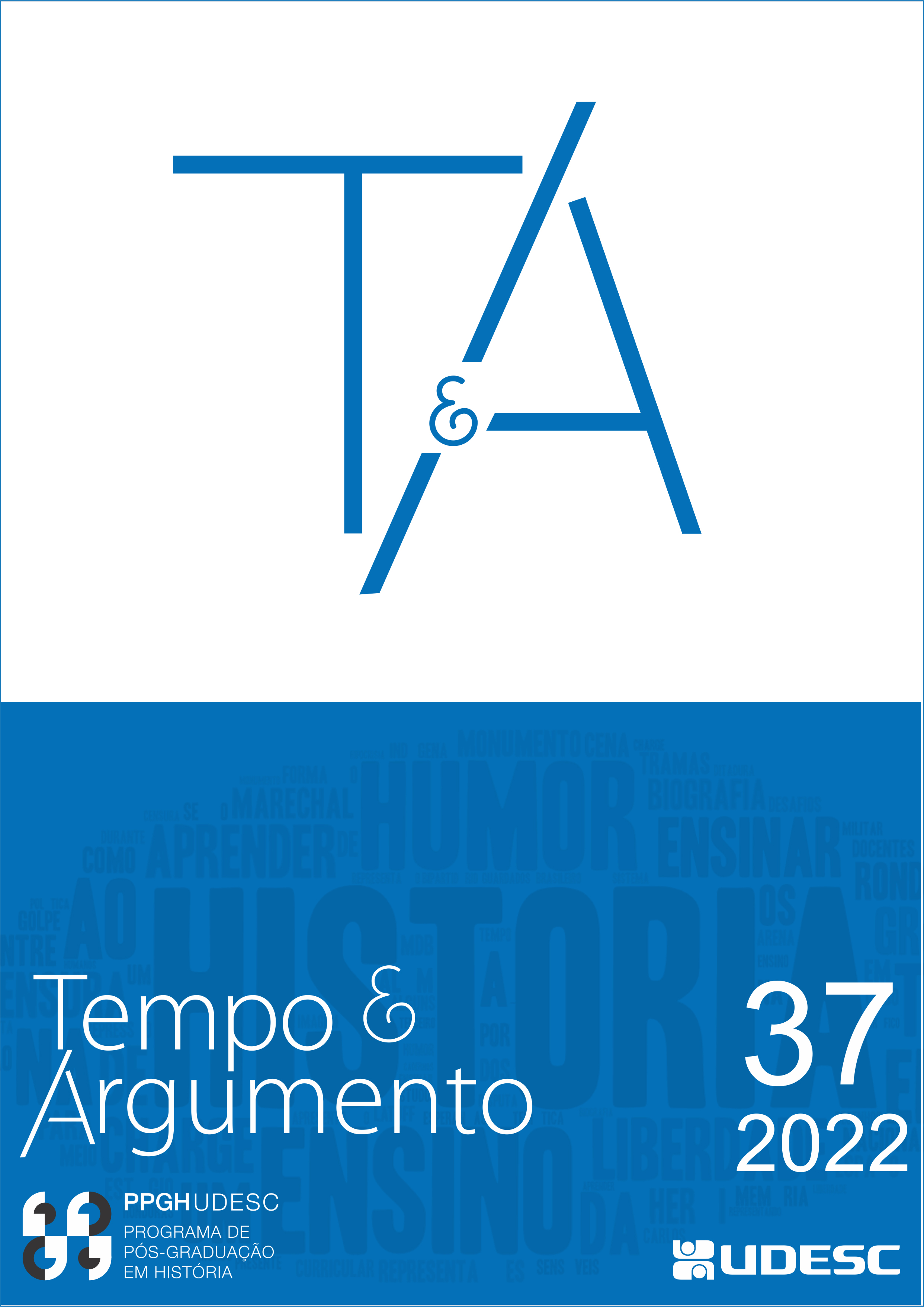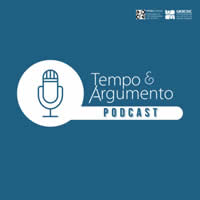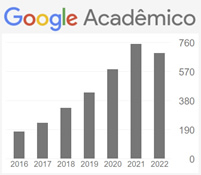Beyond the scene: graphic humor, censorship and repression in the play "Liberdade, Liberdade"
DOI:
https://doi.org/10.5965/2175180314372022e0104Keywords:
military dictatorship, theater, political humor, caricatureAbstract
This paper aims to analyze the show Freedom, freedom through the relations between graphic humor and theater during the Brazilian dictatorship. The play premiered in Rio de Janeiro in 1965, by Flávio Rangel and Millôr Fernandes. It was produced by Grupo Opinião and in its first season many names from the Brazilian cultural art scene starred at the play: Paulo Autran, Nara Leão, Oduvaldo Viana Filho and Tereza Raquel. Throughout its trajectory, issues arised with censorship, paramilitary forces and the high echelon of the dictatorial government. Before this complex scenario, the objective of this article will be to understand some aspects of the show by analyzing the relationship of the play and graphic humor, both in the play itself and in the press. Using the caricature included in the play program and published cartoons in the newspapers Correio da Manhã and Última Hora, we seek to demonstrate that cartoonists appropriated the play to create blunt critics of the military regime. Through these sources we intend to analyze at least three elements: 1) the use of humor as a visual and narrative strategy; 2) the difficulties faced by the State to establish censorship criteria; 3) the denunciation of the paramilitary actions suffered by the play. The hypothesis is that this type of document will allow the investigation of the play’s impact within the cultural field of resistance to the regime, as well as its reverberations in the press and in the government.
Downloads
References
ARAUJO, Maria P. A utopia fragmentada: as novas esquerdas no Brasil e no mundo na década de 1970. Rio de Janeiro: Editora da Fundação Getúlio Vargas, 2000.
CONY, Carlos Heitor. O ato e o fato. Rio de Janeiro: Civilização Brasileira, 1979.
FERNANDES, Hélio. Ur-gente. Tribuna da Imprensa, Rio de Janeiro, p. 2, 31 maio 1965.
FONSECA, Joaquim da. Caricatura: a imagem gráfica do humor. Porto Alegre: Artes e Ofícios, 1999.
FORTUNA. [Charge satirizando o atentado da LIDER]. Correio da Manhã, p. 6, 01 jun. 1965.
FREDERICO, Celso. A política cultural dos comunistas. In: MORAES, João Quartim de Morais (org.). História do marxismo no Brasil: vol. III. Campinas: Editora da Unicamp, 2007. p. 337-372.
GARCIA, Miliandre. Ou vocês mudam, ou acabam: teatro e política na ditadura militar. 2008. Tese (Doutorado em História Social) – Universidade Federal do Rio de Janeiro, 2008.
GARCIA, Miliandre. A censura de costumes no Brasil: da institucionalização da censura teatral no século XIX a extinção da censura da constituição de 1988. Rio de Janeiro: Biblioteca Nacional, 2009. 77 p. Disponível em: http://www.bn.br/portal/arquivos/pdf/miliandreGarcia.pdf. Acesso em: 19 mar. 2022.
GARCIA, Miliandre. Quando a moral e a política se encontram: a centralização da censura de diversões públicas e a prática da censura política na transição dos anos 1960 para os 1970. Dimensões, Vitória, v. 32, p. 79-110, 2014.
GRUPO OPINIÃO. Liberdade, liberdade [programa do espetáculo]. Rio de Janeiro, 1965.
GRUPO OPINIÃO. Liberdade, liberdade [programa do espetáculo]. São Paulo, 1966.
GULLAR, Ferreira. [Entrevista cedida a] Natália Batista. Rio de Janeiro (RJ), 13 jul. 2012.
JAGUAR. Jaguar e a censura. Última Hora, Rio de Janeiro, p. 3, 22 abril 1965.
LIBERDADE chama RP para conter a Lider. Última Hora, Rio de Janeiro, p. 5, 29 maio 1965a.
LIBERDADE não cedeu a show de baderna. Última Hora, Rio de Janeiro, p. 2, 31 maio 1965b.
LIBERDADE sobrevive. Última Hora, Rio de Janeiro, p. 4, 31 maio 1965c
MORAES, D. Vianinha: cumplice da paixão. Rio de Janeiro: Record, 2000.
MOTTA, Rodrigo Patto Sá. Jango e o golpe de 1964 na caricatura. Rio de Janeiro: Jorge Zahar, 2006.
MOTTA, Rodrigo Patto Sá. A ditadura nas representações verbais e visuais da grande imprensa (1964-69). Topoi, Rio de Janeiro, v. 14, p. 62-85, 2013.
NAPOLITANO, Marcos. Coração civil: arte, resistência e lutas culturais durante o regime militar brasileiro (1964-1980). São Paulo: Universidade de São Paulo, 2011.
NAPOLITANO, Marcos. Coração civil: a vida cultural brasileira sob o regime militar (1964-1985): ensaio histórico. São Paulo: Intermeios, 2017.
NEVES, João das. [Entrevista cedida a] Natália Batista. Lagoa Santa (MG), 09 maio. 2012.
NOTA da direção. Tribuna da Imprensa, Rio de Janeiro, p. 3, 24 abr. 1965.
PARETO: “Liberdade” é falsa e comunista. Diário de Notícias, Rio de Janeiro, p. 6, 4 jun. 1965.
RANGEL, Flávio; FERNANDES, Millôr. Liberdade, liberdade. Rio de Janeiro: Civilização Brasileira, 1965.
SIQUEIRA, José Rubens. Viver de teatro: uma biografia de Flávio Rangel. São Paulo: Nova Alexandria, 1995. 383 p.
THOMPSOM, Edward Palmer. A miséria da teoria ou um planetário de erros. Rio de Janeiro: Zahar, 1981.
WOLFF, Fausto. Liberdade Liberdade. Tribuna da Imprensa, Rio de Janeiro, p. 3, 24 abr. 1965.
Downloads
Published
How to Cite
Issue
Section
License
Copyright (c) 2022 Tempo e Argumento

This work is licensed under a Creative Commons Attribution-NonCommercial 4.0 International License.
The articles published by the magazine are for free use, destined for educational purposes and not commercial. The copyrights are all granted to the magazine. The articles whose authors are identified represent the expressed opinion of its authors and not the official position of the Tempo e Argumento magazine or of the Postgraduate Program in History of the Universidade do Estado de Santa Catarina.




